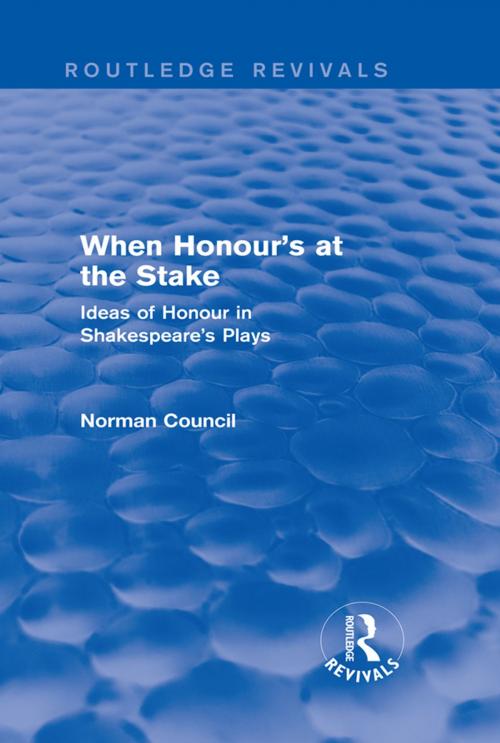When Honour's at the Stake (Routledge Revivals)
Fiction & Literature, Literary Theory & Criticism, Drama History & Criticism, British| Author: | Norman Council | ISBN: | 9781317672944 |
| Publisher: | Taylor and Francis | Publication: | June 27, 2014 |
| Imprint: | Routledge | Language: | English |
| Author: | Norman Council |
| ISBN: | 9781317672944 |
| Publisher: | Taylor and Francis |
| Publication: | June 27, 2014 |
| Imprint: | Routledge |
| Language: | English |
Renaissance ideas of honour had a profound influence on the English people who formed Shakespeare’s audiences. In When Honour’s at the Stake, first published in 1973, Norman Council describes the increasing importance of these ideas to the themes and structure of a number of Shakespeare’s major plays.
The validity of the most widely approved code of honour was being challenged on a variety of fronts, yet both personal standards of behaviour and public affairs were habitually understood in terms of honour. A series of tragedies are given their basic form by dramatizing the pernicious effects of man’s disobedience to the various demands of honour; in Julius Caesar, Troilus and Cressida, Hamlet, Othello, and King Lear honour is among the principal motives of tragedy. In this way, the modern reader’s comprehension of the plays can be greatly enhanced by reference to Elizabethan honour codes.
Renaissance ideas of honour had a profound influence on the English people who formed Shakespeare’s audiences. In When Honour’s at the Stake, first published in 1973, Norman Council describes the increasing importance of these ideas to the themes and structure of a number of Shakespeare’s major plays.
The validity of the most widely approved code of honour was being challenged on a variety of fronts, yet both personal standards of behaviour and public affairs were habitually understood in terms of honour. A series of tragedies are given their basic form by dramatizing the pernicious effects of man’s disobedience to the various demands of honour; in Julius Caesar, Troilus and Cressida, Hamlet, Othello, and King Lear honour is among the principal motives of tragedy. In this way, the modern reader’s comprehension of the plays can be greatly enhanced by reference to Elizabethan honour codes.















